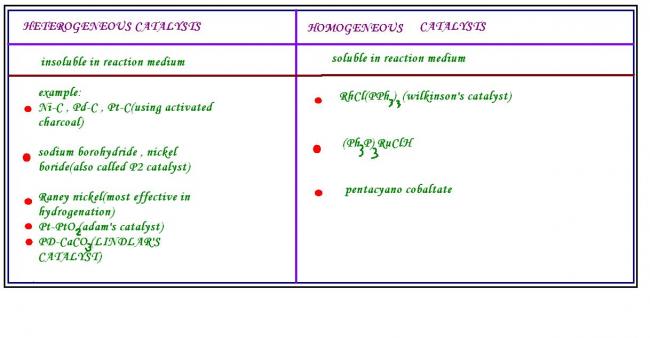dude which do u think are the most impt. chapters in organic ... and pls give tips as to how to study biochem!!
this thread aims at discussions on all possible aspects of organic chemistry that we feel are important for JEE 2010 !
members can put forward their question in this thread and we shall try and answer them together ! short contributions on other aspects are also welcome !
....hoping for the best of response !
-
UP 0 DOWN 0 5 14

14 Answers
for biochemistry we should consult RSM(FIITJEE) and ARIHANT(SPECTRUM magazine)....thats enough !
....the important things in the chapter are the linkages in the biomolecues(1,4...1,6 etc ) and isomerisms !...rest is bakwaas and board stuff !
lets start from the beginning !the chapter on hydrocarbons !
i start with a brief discussion on catalysts used for hydrogenation !
N.B. HETEROGENEOUS CATALYSTS have the advantage being easily separable from reaction mixture whereas HOMOGENEOUS CATALYSTS have the advantages of better reproducibility and better selectivity !
I hav 1 question ....
Does IIT strictly follow the syllabus that they give ...or they sometimes go out of syllabus also???
And in organic ....
for example ...in arihant and even in my class notes...they hav given 10 to 12 methods of preparation of alkanes.... while in JEE syllabus only 2 methods of preparation are metioned ... viz.. wurtz reaction and decarboxylation method ...so shud i do those all 10 to 12 methods ??
Or just these 2 methods ??
by studying word to word from any syllabii, you may get questions from your knowledge but one thing that will definitely lack will be confidence to solve unknown problems !
regarding named reactions they will never go out of syllabus....and they will never ask any mechanism which is not in syllabus...
lets start something on isomerism. i reproduce one of my old posts here!
Some Golden Rules In Isomerism:
total number of geometrical isomers in polyenes
(1) 2n---->when terminal groups or atoms are different on both sides (n-->no of double bonds)(e.g. 2,4 heptadiene has 22=4 isomers
(2) 2n-1+2n/2-1------->when terminal groups or atoms are same(e.g. 2,4 hexadiene has 21 + 20 =3 isomers
total no of optical isomers of a compound
(1) when the molecule cannot be divided into equal halves and (n) is the number of asymmetric carbon atoms
number of (d) and (l) forms =(a)= 2n
number of meso forms = (m) =20
total number of isomers = (a) +(m)
(2)when the molecule can be divided into equal halves
(i) (n)---->number of asymmetric carbon atoms is even
(d) and (l) isomers =(a) = 2n-1
meso isomers =(m) = 2n/2-1
total no of isomers = (a) +(m)
(ii) (n)------>number of asymmetric carbon atoms is odd
(d) and (l) isomers =(a) = 2n-1- 2n/2-1/2
meso isomers =(m) = 2n/2-1/2
total number of isomers= 2n-1
an interesting question comes up next !
why does baeyer villiger oxidation of 1,3 diketones give anhydrides ??
debo you asked this on goiit too..lol. you were quite fed up I remember. And it was 1,2-diketones I think.